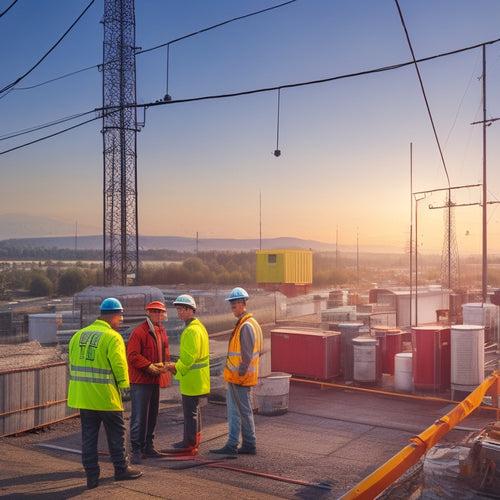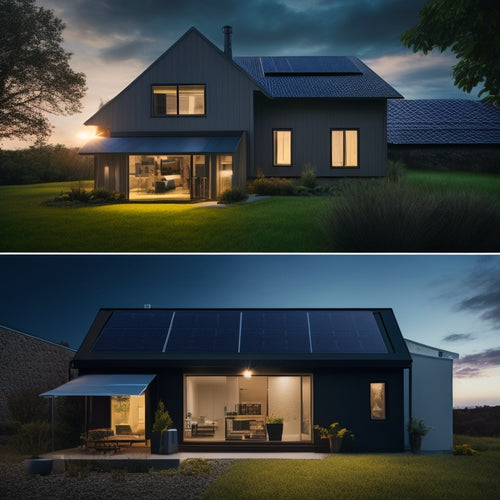
House Battery System
Share
You install a house battery system to guarantee a reliable and efficient backup power source during grid failures, providing energy independence and control over your energy usage while protecting your appliances and reducing reliance on the grid. It provides silent operation at night, allowing you to utilize energy generated during the day for nighttime use. With deep cycle battery technology, your system's lifespan is greatly extended, even exceeding that of traditional generators. To optimize performance, you'll want to check your battery management systems regularly. As you investigate house battery systems further, you'll find out how to configure and optimize your setup for maximum efficiency and cost-effectiveness.
The Essentials
- House battery systems provide reliable backup power during grid failures, ensuring essential appliances remain operational and reducing reliance on the grid.
- Deep cycle batteries are a popular choice for house battery systems due to their high capacity and long lifespan, with some lasting over 3,000 cycles.
- A well-designed house battery system can prevent food spoilage and protect sensitive electronics during power outages, while also reducing energy costs.
- Battery maintenance and management are crucial for peak performance, including regular inspections, monitoring electrolyte levels, and using battery management systems.
- House battery systems can be optimized for energy efficiency and cost-effectiveness through proper system configuration, including battery sizing, installation type, and inverter choice.
Reliability in Power Outages
When you invest in a house battery system, you expect it to provide reliable backup power sources during grid failures. You need a system that can seamlessly switch to battery power during outages, ensuring your essential appliances remain operational.
A reliable battery backup for home provides an all-encompassing solution to three common problems that often arise during these events.
Backup Power Sources
You need a reliable backup power source to guarantee continuous operation of your house battery system during power outages. This backup power source secures your energy independence, allowing you to maintain control over your energy usage and needs.
A reliable backup power source also enables seamless solar integration, where your solar panels can continue to generate energy even when the grid is down. With a reliable battery backup for home Home Energy Storage, you can prevent food spoilage, maintain safety, and protect sensitive electronics from damaging power surges.
When selecting a backup power source, consider factors such as capacity, efficiency, and compatibility with your house battery system. A battery-based backup power source, like a deep cycle battery, is a popular choice due to its high capacity and long lifespan.
You can also consider a generator-based backup power source, which provides a reliable and efficient means of generating power during outages. In either case, a well-designed backup power source guarantees your house battery system remains operational, providing you with the energy independence you desire.
Grid Failure Protection
During extended power outages, a reliable grid failure protection system guarantees your house battery system remains operational, providing you with the energy independence you need.
This system assures that your solar integration setup continues to generate power, even when the grid is down. With a grid failure protection system in place, you can rest confident that your energy storage system will keep your home running smoothly, without any interruptions.
Furthermore, by reducing your reliance on noisy, polluting generators Renewable Energy, you can enjoy a quieter and more environmentally friendly backup power solution.
The system automatically detects grid failures and seamlessly switches to backup power mode, allowing your house battery system to take over. This means you won't experience any power disruptions, and your essential appliances will continue to function as usual.
The grid failure protection system is designed to prioritize your energy needs, guaranteeing that your critical loads are always powered.
Silent Operation at Night
You expect your house battery system to provide power when you need it, even at night, without disrupting your peaceful environment.
With reliable residential energy storage solutions like backup power systems and home battery backup systems, nighttime energy harvesting is essential, allowing your system to recharge silently while you sleep.
Nighttime Energy Harvesting
Nighttime energy harvesting is a critical component of a house battery system, as it allows for silent operation at night when the sun is not shining and the grid is not available. This means you can enjoy the benefits of renewable energy even when the sun has set. A well-designed house battery system guarantees that your energy needs are met during the night, using the energy stored during the day.
| Energy Source | Operation |
|---|---|
| Solar Panels | Charging batteries during the day |
| Grid Connection | Supplementing energy when available |
| House Battery | Providing energy at night |
| Generator | Backup power during extended outages |
| Energy Efficiency | Optimizing energy usage through smart home automation |
Quiet Power Systems
Silent operation at night is a hallmark of a well-designed house battery system, thanks to quiet power systems that guarantee a peaceful living environment. You can rest confident that your energy needs are being met without disrupting your daily life.
Quiet power systems achieve this through advanced solar integration and energy-efficient design. By utilizing the power of the sun during the day, your house battery system can store excess energy for nighttime use. This means you can enjoy the freedom to live life on your own terms, without worrying about noise pollution or high energy bills.
In a quiet power system, the inverter and charger work in tandem to ascertain seamless energy flow. The inverter converts DC power from the solar panels or battery bank to AC power for your home, while the charger replenishes the battery bank during the day.
This collaboration guarantees that your energy needs are met efficiently and quietly, giving you the freedom to live life to the fullest.
Deep Cycle Battery Technology
You'll want to contemplate the cycle life expectancy of your deep cycle batteries, as it directly impacts the overall lifespan of your house battery system.
A longer cycle life means fewer replacements and reduced maintenance costs over time.
When selecting a deep cycle battery, look for high-performance options that can efficiently store renewable energy storage and reduce your reliance on the grid.
Additionally, understanding the battery maintenance needs will help you optimize performance and extend the battery's lifespan.
Cycle Life Expectancy
Deepening your understanding of cycle life expectancy is essential when selecting a deep cycle battery for your house battery system. You want to guarantee the battery you choose will provide reliable performance and longevity.
Cycle life expectancy refers to the number of charge and discharge cycles a battery can handle before its capacity drops below 80% of its original rating. This metric is critical, as it directly impacts the overall cost-effectiveness and efficiency of your system.
When evaluating cycle life expectancy, consider factors that influence cycle performance, such as depth of discharge (DOD), temperature, and charging/discharging rates.
Longevity factors like manufacturing quality, materials, and design also play a significant role. A higher cycle life expectancy translates to a longer-lasting battery, reducing replacement costs and minimizing waste.
Look for batteries with a high cycle life expectancy, typically above 3,000 cycles, to guarantee your house battery system operates efficiently and effectively over its lifespan.
Battery Maintenance Needs
Regularly inspecting and maintaining your deep cycle battery is crucial to guarantee peak performance, prolong its lifespan, and prevent premature degradation. You'll need to perform routine checks to verify your battery operates within ideal conditions.
Start by inspecting the battery terminals and connections for signs of corrosion or wear. Clean the terminals and reconnect them securely to prevent electrical resistance.
Next, check the electrolyte levels, confirming they're at the recommended level. Top off the electrolyte as needed, but avoid overfilling, which can lead to acid spillage.
Perform battery cleaning regularly to remove dirt and grime that can reduce performance.
You should also monitor your battery's state of charge, voltage, and temperature. These metrics will help you identify potential issues before they become major problems.
Check Battery Management Systems
You'll need to check your battery management system to guarantee it's running efficiently. This involves using battery monitoring tools to track performance and adjust system configuration options as needed.
With a reliable home energy storage solutions in place, you can maximize your solar energy output and reduce your reliance on the grid. By doing so, you'll be able to identify potential issues before they become major problems.
Battery Monitoring Tools
Implementing a reliable battery monitoring system is essential to ensuring the best performance and longevity of your house battery system. You need to keep a close eye on your battery's state of charge, voltage, and temperature to prevent damage and optimize its performance. This is where battery monitoring tools come in.
There are various monitoring apps and devices available that can provide you with real-time data on your battery's health. These tools can alert you to any potential issues, such as low voltage or high temperatures, allowing you to take corrective action.
Here is a comparison of some popular battery monitoring tools:
| Tool | Features |
|---|---|
| Victron BMV-712 | State of charge, voltage, temperature, and alarms |
| Renogy BT-1 | State of charge, voltage, temperature, and Bluetooth connectivity |
| Tesla Powerwall App | Real-time monitoring, energy usage tracking, and notifications |
| SimpliPhi Power App | Real-time monitoring, state of charge, and system performance tracking |
System Configuration Options
Your house battery system's configuration is vital to its overall performance and longevity. When designing your system, you'll need to evaluate various configuration options to guarantee it meets your specific needs and goals.
Battery sizing is important, as undersized batteries can lead to premature wear, while oversized batteries can be cost-prohibitive. Installation options, such as floor-mounted or wall-mounted systems, also impact the overall design.
Inverter types, including string inverters, microinverters, and power optimizers, affect energy efficiency and system scalability. Cost considerations, including upfront costs and long-term savings, must be balanced against the environmental impact of your system.
Load management, which involves prioritizing energy usage during peak hours, is also significant. Safety features, such as overcharge protection and surge protection, are vital to prevent system damage and guarantee user safety.
A user-friendly interface allows you to monitor and control your system, making adjustments as needed. By carefully evaluating these configuration options, you can create a customized house battery system that meets your unique needs and provides reliable, efficient energy independence.
Longer Lifespan Than Generators
You'll find that a house battery system can provide extended power availability, as it's designed to last for thousands of charge cycles, compared to traditional generators that typically have a much shorter lifespan.
This means you'll have a reliable source of power for years to come, without the hassle and expense of frequent replacements.
With a house battery system, you can expect to get 10-15 years of continuous power, making it a more sustainable option for your energy needs.
Extended Power Availability
By integrating a house battery system, homeowners can greatly extend power availability, enjoying a longer lifespan than traditional generators. This means you'll have a reliable source of energy when you need it most, without the hassle and noise of generators.
With a house battery system, you can store excess energy generated by your solar panels or wind turbines during the day, and use it at night or during power outages. This not only provides energy independence but also enables sustainable living.
The batteries can be charged and discharged multiple times, making them a more cost-effective option in the long run. You'll also reduce your reliance on the grid, which can be vulnerable to outages and blackouts.
With a house battery system, you'll have the freedom to live life on your own terms, without worrying about power interruptions. Plus, you'll be doing your part for the environment by reducing your carbon footprint.
Frequently Asked Questions
Can I Use My Existing Electrical Panel With a House Battery System?
You can potentially use your existing electrical panel, but it's essential to assess its compatibility with the battery system integration, guaranteeing safe and efficient power flow, and considering upgrades or modifications to facilitate seamless harmony between the two systems.
How Long Does It Take to Fully Charge a House Battery System?
When you're relying on renewable energy, you'll want to know how long it takes to fully charge your batteries. The answer depends on charging speed and battery capacity - you'll need to calculate the charging time based on your system's unique specs to gain energy independence.
Are House Battery Systems Compatible With Solar Power Systems?
You'll find that solar power systems seamlessly integrate with battery storage solutions, allowing you to capture and store excess energy for later use, thanks to advanced solar integration technologies that optimize energy harvesting and storage.
Can I Install a House Battery System Myself or Do I Need a Professional?
Ha! You think you're a skilled electrician, but trust us, DIY installation of a complex system like this can be a recipe for disaster. Safety considerations are essential, so don't risk it - hire a pro to guarantee a safe and efficient setup.
Are There Any Incentives or Rebates Available for House Battery Systems?
You can investigate federal incentives and local rebates that support sustainable energy solutions, which may cover a significant portion of your house battery system's cost, giving you more freedom to invest in your energy independence.
Final Thoughts
When the lights go out, your house battery system is the ace up your sleeve. With a reliable power supply, silent operation at night, and advanced deep cycle battery technology, you'll be sitting pretty. Don't forget to check your battery management systems to verify everything runs smoothly. And, in the long run, your house battery system will outlast those noisy generators, making it a sound investment. So, when the going gets tough, your house battery system will get going, keeping you powered up and ahead of the game.
Related Posts
-

Top Off Grid Solar Batteries for Renewable Energy
When seeking top off-grid solar batteries for renewable energy, consider options with advanced battery chemistry, suc...
-

Smart Grid Technology Implementation Challenges
You'll encounter several challenges when implementing smart grid technology, particularly in cost management, scalabi...
-

Cost of Home Solar Battery
You're looking to invest in a home solar battery to reduce your grid reliance, but you're curious about the cost. The...


